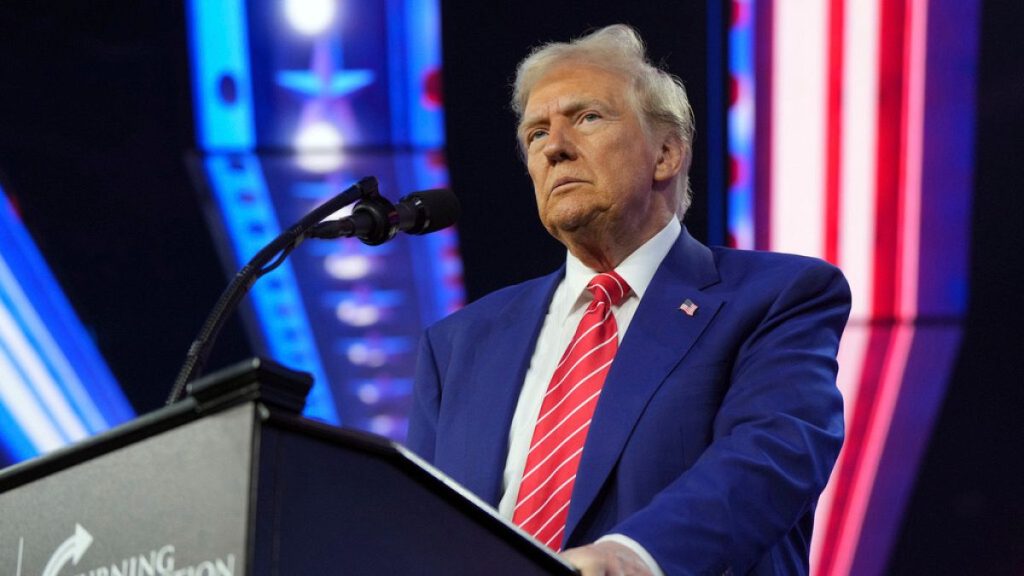Donald Trump, following Justin Trudeau’s resignation as Canadian Prime Minister, reignited his controversial proposal for Canada to become the 51st US state. Trump, utilizing his Truth Social platform, argued that such a merger would eliminate tariffs, reduce taxes, and enhance Canada’s security against perceived threats from Russia and China. He linked Trudeau’s resignation to Canada’s trade deficit with the US, suggesting Trudeau acknowledged the economic imbalance and stepped down as a consequence. This isn’t Trump’s first foray into this idea; he has previously claimed a substantial portion of Canadians support the merger, a claim contradicted by polling data showing significantly lower support. Trudeau’s unexpected resignation, attributed to internal political struggles and perceived governmental ineffectiveness, has been criticized for its timing, occurring mere weeks before Trump’s inauguration and amidst his threats of imposing significant tariffs on Canadian goods. Experts suggest the resignation leaves Canada vulnerable and ill-prepared to counter the potential economic impact of Trump’s proposed tariffs, which could severely damage the Canadian economy.
Trump’s pronouncements extended beyond Canada, revisiting his interest in Greenland becoming part of the US. He cited unsubstantiated claims of Greenlandic support for his political movement and announced his son, Donald Trump Jr.’s, upcoming visit to the island, framed as an exploration of Greenland’s “magnificent areas and sights.” Trump reiterated his belief that Greenland’s incorporation into the US would greatly benefit its people, emphasizing the island’s strategic importance. While Greenland’s government has confirmed Trump Jr.’s visit, they clarified its personal nature and denied any official meetings scheduled with Greenlandic authorities. This is not Trump’s initial expression of interest in Greenland; he has previously asserted the necessity of US control over the island for national security reasons, even canceling a state visit to Denmark after its Prime Minister rejected the notion.
The timing of Trump’s pronouncements, coinciding with Trudeau’s resignation, raises questions about his intentions and the potential impact on US-Canadian relations. His assertion of Canadian desire for annexation contrasts sharply with public opinion polls, indicating a disconnect between his perception and reality. Furthermore, his linking of Trudeau’s resignation to trade deficits appears opportunistic and lacks substantial evidence. The impending tariff threats loom large, potentially exacerbating the complexities of the bilateral relationship as Canada grapples with a leadership transition. The renewed focus on Greenland, particularly amidst Trump Jr.’s visit, signals Trump’s continued interest in expanding US influence in the Arctic region, potentially escalating tensions with Denmark, which considers Greenland a self-governing territory.
The reaction to Trump’s statements has been mixed. While some may view his pronouncements as mere political posturing, others express concern about the potential implications for international relations and regional stability. Canada’s political landscape, now facing a leadership vacuum, is particularly vulnerable to external pressures, raising concerns about its ability to effectively navigate Trump’s aggressive rhetoric and potential trade policies. Greenland, while expressing its desire for eventual independence from Denmark, has firmly rejected the notion of US acquisition, highlighting the potential for conflict should Trump pursue this objective. The international community will undoubtedly closely monitor Trump’s actions and their potential ramifications for the delicate balance of power in the North American and Arctic regions.
The broader implications of Trump’s pronouncements extend beyond immediate political and economic considerations. His rhetoric reflects a worldview that prioritizes US interests above international cooperation and norms. This approach could further strain relationships with key allies and embolden other nations to pursue similar unilateral actions, potentially destabilizing global order. The timing of these pronouncements, coinciding with a period of international uncertainty, amplifies concerns about the trajectory of US foreign policy under Trump’s leadership. The international community will be watching closely to see whether these pronouncements translate into concrete policy actions and how other nations respond to this assertive posture.
In conclusion, Trump’s renewed pronouncements regarding Canada and Greenland represent more than just rhetorical flourishes; they represent a continuation of his “America First” ideology and a willingness to challenge established international norms. The potential consequences of his words and actions, particularly in the context of Trudeau’s resignation and the upcoming US presidential transition, remain uncertain. However, these pronouncements underscore the importance of international cooperation and diplomacy in navigating complex geopolitical landscapes and addressing shared challenges. The international community will be closely observing Trump’s actions in the coming months to assess the true extent of his intentions and their potential impact on global stability and the future of international relations.














